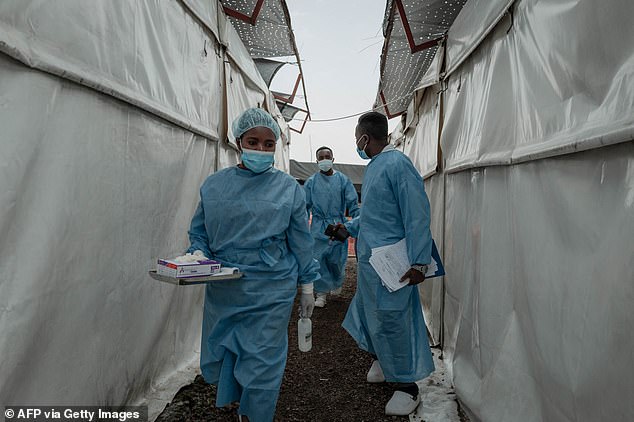Table of Contents
Call it cruel, call it macabre. For most of us, pandemics are human tragedies, like wars or natural disasters.
But there are some investors who view these developments with opportunistic eyes.
The mpox outbreak in Africa is a case in point. Shares of pharmaceutical and biotech companies thought to be likely to benefit from demand for vaccines and diagnostic equipment soared.
The situation was similar during the Covid pandemic. Traders are banking on what the World Health Organization (WHO) described as a “public health emergency of international concern.”
Outbreak: Nyiragongo hospital, Democratic Republic of Congo.
Some will see this as making money out of misery and find the idea unpleasant.
Others will argue that this is a case of capital being channelled into valuable initiatives undertaken by these companies, which will save lives.
Regardless of morality, investors should proceed with caution: investing in companies whose stocks have risen due to MPOX is a risky proposition.
It is currently unclear how severe the situation will become and, therefore, what the magnitude of demand for vaccines and tests might be.
The World Health Organization says the virus has the potential to spread from the Democratic Republic of Congo and other African countries to the entire continent and beyond.
The European Union is expecting more cases after Sweden reported its first on Thursday.
Several companies that have been caught up in the MPOX stock craze are listed overseas. Small investors can buy and sell through an investment platform.
However, they should be aware that this entails foreign exchange and investment risks.
Anyone considering jumping on the bandwagon should be aware that stocks in this area are volatile and prone to wild ups and downs.
Among the risks is the difficulty of obtaining regulatory approval for tests and vaccines. Even if it is granted, companies could struggle to profit from the situation.
This may sound contradictory, but pharmaceutical companies are caught in a perennial conflict between maximizing their profits, on the one hand, and making vaccines and medicines available for the good of humanity, on the other.
So far, the mpox outbreak has been concentrated in poor countries, meaning providers are under pressure to offer vaccines for free or at low cost.
As Dr. Jean Kaseya, director general of the public health agency Africa CDC, said last week: “The vaccine is very expensive, you can say it costs about $100 per dose. There are not many countries in Africa that can afford that cost.”
However, providing a vaccine for a virus like mpox may have non-financial benefits.
AstraZeneca did not seek to fill its coffers with its Covid vaccine, but it still benefited from a halo effect.
It has just become one of the few UK companies whose stock market value has exceeded £200bn.
But there are other risks, including the risk of large legal actions against a company if things go wrong.
Rapid share price increases in scenarios like these are often driven by City traders trying to make a quick turnaround.
The standard advice for individual investors is to avoid being influenced by short-term market fads and take a long-term view.
A good question to ask yourself is whether you would consider investing in one of these companies if you hadn’t been caught up in the MPOX buying frenzy.
We are not making investment recommendations here, but rather taking a look at the businesses that are hiding behind all that hype.
Bavarian Nordic
Much of the mpox market hype has centered on this Danish company. Its shares have risen more than 90 percent in the past year and are up nearly 40 percent in the past five days.
Denmark, which is also home to Novodnisk, the maker of Ozempic and Wegovy, is developing a reputation in the life sciences field.
Bavarian Nordic boss Paul Chaplin is British.
It said on Saturday it is working with the WHO and the Africa CDC to ensure “equitable access” to its vaccine.
This can be read as a clear sign that he is not seeking to obtain the maximum benefit.
It added that it is seeking approval to use its vaccine in adolescents, who, along with children, those with weakened immune systems and pregnant women, are thought to be at particular risk.
The 32-year-old company, which will announce its first-half results this week, has the advantage of having the only mpox vaccine approved in the United States and Europe.
It supplied more than 15 million doses in an earlier outbreak in 2022 of a different strain of mpox.
So it has a proven track record, although investor gains from the previous mpox episode did not hold up.
Its shares rose sharply in 2022 only to fall sharply again.
Even after their latest rise, they are still below the height they reached two summers ago.
Bavarian Nordic is valued on the Copenhagen Stock Exchange at 22 billion Danish kroner or around 2.5 billion pounds.
In addition to its MPOX vaccine, it has others, including those for tick-borne encephalitis, rabies, cholera and typhoid fever.

WHO chief Dr Tedros Adhanom Ghebreyesus
Novacyt
Listed on the AIM junior market in London and Paris, Novacyt is a familiar name to UK retail investors.
Many private shareholders followed the spectacular rise and fall of their shares during the Covid pandemic.
Its aim is to carry out virus detection tests and its shares soared more than 45 per cent on Friday to 96 pence on hopes it could supply diagnostic tests for MPOX. It rose another 23 per cent yesterday.
But as investors who have followed its performance during the pandemic and its aftermath will know, Novacyt shares are nothing if not volatile.
They were listed on AIM in 2017 at 59p. By early 2020, before COVID hit, they were trading at around 13p.
Shopping during the pandemic took them on an incredible upward journey to a peak of just under £12.80 in October of that year.
Novacyt’s status as the City’s darling was short-lived as it became embroiled in a legal dispute with the government over its testing. Earlier this summer, it agreed to pay £5m as part of a settlement.
Emerging biosolution
The company’s mission is to “defend people from things we hope will never happen,” including biological warfare, drug overdoses and deadly viruses.
The 25-year-old US company makes Narcan nasal spray, used to reverse opioid overdoses, and treatments for anthrax and botulism.
But what is of most interest to traders, who pushed the stock up 55 percent on the New York market last week (and another 15 percent yesterday), is a product that is celebrated under the name ACAM2000.
This is a smallpox vaccine that Emergent bought from Sanofi, the French pharmaceutical giant, in 2017.
This may have seemed a quixotic purchase, given that the WHO declared smallpox eradicated in May 1980, making it the only infectious disease to have been eradicated.
The smallpox vaccine was introduced to Europe in 1721, when Lady Mary Wortley Montagu, a pioneering scientist and feminist, inoculated her three-year-old daughter with a small dose of the disease.
Why, then, more than 300 years later, is there so much interest in a vaccine to protect against a disease we have defeated? You guessed it: smallpox is related to mpox.
Emergent is awaiting approval from drug regulators to use its smallpox vaccine to combat the disease.
It submitted an application to the US Food and Drug Administration in November last year.
DIY INVESTMENT PLATFORMS

AJ Bell

AJ Bell
Easy investment and ready-to-use portfolios

Hargreaves Lansdown

Hargreaves Lansdown
Free investment ideas and fund trading

interactive investor

interactive investor
Flat rate investing from £4.99 per month

Saxo

Saxo
Get £200 back in trading commissions

Trade 212

Trade 212
Free treatment and no commissions per account
Affiliate links: If you purchase a product This is Money may earn a commission. These offers are chosen by our editorial team as we believe they are worth highlighting. This does not affect our editorial independence.
Some links in this article may be affiliate links. If you click on them we may earn a small commission. This helps us fund This Is Money and keep it free to use. We do not write articles to promote products. We do not allow any commercial relationships to affect our editorial independence.


